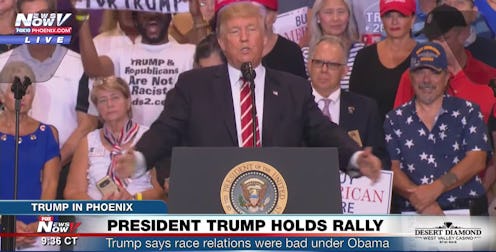
As Trump's campaign-style rally in Phoenix, Arizona neared, one question lingered in the minds of so many Americans: Will Trump apologize for blaming the violence in Charlottesville on "many sides"? Phoenix Mayor Greg Stanton certainly hoped he would. But when the president stood on stage in Phoenix, Trump suggested he's a Charlottesville victim — not Heather Heyer, who tragically lost her life, or the counter-protesters who were badly injured, or the black Americans who were so cruelly targeted by neo-Nazi signs and chants.
UPDATE: Trump did, in fact, mention Heather Heyer in his Phoenix rally speech. He said that the media "also said that he must be a racist because he never mentioned the driver of the car, who is a terrible person, drove the car and he killed Heather, and it’s a terrible thing ... "
As opposed to taking the Phoenix rally as an opportunity to portray himself as a leader during trying times, Trump defended himself against what he calls the "dishonest media" and re-read his statements on the Charlottesville violence to prove himself.
What happened in Charlottesville strikes at the core of America. And tonight, this entire arena stands united against the thugs who perpetrate hatred and violence. I strongly condemn neo-Nazis, white Supremacists and the KKK.
Though he condemned neo-Nazis, he didn't use his stage time to remember Heyer, or comfort her family, or convince those who hoped he would be a better role model. Instead, he mentioned that he had a home in Charlottesville and continued to bash the media for criticizing the way he handled the situation over a week ago.
Accusing the media of "making up sources" and misrepresenting him, Trump continued:
Truly dishonest people in the media and the fake media, they make up sources ... they don't report the facts, just like they don't want to report that I spoke out against hatred and violence and strongly condemned the neo-Nazis, the white supremacists and the KKK.
But when Trump re-read his Charlottesville statements to the audience in Phoenix, he failed to repeat the phrase that had actually disturbed people — including the press — to begin with. The president glossed over the fact that although it's true that he certainly condemned neo-Nazis and white supremacists, he also blamed "many sides" for the violence instead of focusing on the fact that racism is very much alive in America.
This surely came as a disappointment to Americans who hoped he would step to the plate and focus less on himself and more on the actual victims of Charlottesville. Even so, it was a learning lesson — a learning lesson that after months in office, Trump has not changed and probably will not change in the years to come.